 W
WEthan Allen was a farmer, businessman, land speculator, philosopher, writer, lay theologian, American Revolutionary War patriot, and politician. He is best known as one of the founders of Vermont and for the capture of Fort Ticonderoga early in the Revolutionary War. He was the brother of Ira Allen and the father of Frances Allen.
 W
WJoshua Babcock (1707–1783) was a physician, American Revolution general, Rhode Island Supreme Court justice, and postmaster from Westerly, Rhode Island.
 W
WJohn Cadwalader was a commander of Pennsylvania troops during the American Revolutionary War and served under George Washington. He was with Washington at Valley Forge.
 W
WRichard Caswell was an American politician and lawyer who served as the first and fifth governor of the state of North Carolina from 1776 to 1780 and from 1785 to 1787. He also served as a senior officer of militia in the Southern Theater of the American Revolutionary War. He was a signatory of the Continental Association and thus considered one of the Founding Fathers of the United States.
 W
WGeorge Rogers Clark was an American surveyor, soldier, and militia officer from Virginia who became the highest-ranking American patriot military officer on the northwestern frontier during the American Revolutionary War. He served as leader of the militia in Kentucky throughout much of the war. He is best known for his celebrated captures of Kaskaskia (1778) and Vincennes (1779) during the Illinois Campaign, which greatly weakened British influence in the Northwest Territory. The British ceded the entire Northwest Territory to the United States in the 1783 Treaty of Paris, and Clark has often been hailed as the "Conqueror of the Old Northwest".
 W
WWilliam Lee Davidson (1746–1781) was an officer in the North Carolina militia and Continental Army during the American Revolutionary War. He was born in Pennsylvania and moved with his family to Rowan County, North Carolina in 1750. He was killed at the Battle of Cowan's Ford.
 W
WJohn Dickinson, a Founding Father of the United States, was a solicitor and politician from Philadelphia, Pennsylvania, and Wilmington, Delaware, known as the "Penman of the Revolution" for his twelve Letters from a Farmer in Pennsylvania, published individually in 1767 and 1768. As a member of the First Continental Congress, where he was a signee to the Continental Association, Dickinson drafted most of the 1774 Petition to the King, and then, as a member of the Second Continental Congress, wrote the 1775 Olive Branch Petition. When these two attempts to negotiate with King George III of Great Britain failed, Dickinson reworked Thomas Jefferson's language and wrote the final draft of the 1775 Declaration of the Causes and Necessity of Taking Up Arms. When Congress then decided to seek independence from Great Britain, Dickinson served on the committee that wrote the Model Treaty and then wrote the first draft of the 1776–1777 Articles of Confederation and Perpetual Union. Dickinson later served as president of the 1786 Annapolis Convention, which called for the Constitutional Convention of 1787. Dickinson attended the Convention as a delegate from Delaware.
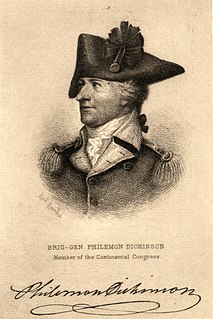 W
WPhilemon Dickinson was an American lawyer and politician from Trenton, New Jersey. As a brigadier general of the New Jersey militia, he was one of the most effective militia officers of the American Revolutionary War. He was also a Continental Congressman from Delaware and a United States Senator from New Jersey.
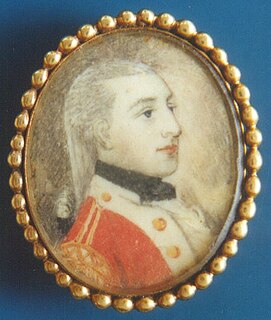 W
WSamuel Elbert was an American merchant, soldier, and politician from Savannah, Georgia.
 W
WWilliam Floyd was an American politician from New York, delegate to the Continental Congress, and a signer of the Continental Association and the United States Declaration of Independence. He is one of the Founding Fathers of the United States.
 W
WDavid Forman was born in Monmouth County, New Jersey of parents Joseph Forman and Elizabeth Lee. His father was a wealthy shipowner and he was educated at Princeton. At the start of the American Revolutionary War he rallied to the patriot cause and was appointed lieutenant colonel of a New Jersey state regiment. When his commander assumed command of the brigade, he was promoted colonel of the regiment during the New York and New Jersey Campaign in 1776. At the time of the battles of Trenton and Princeton Forman's regiment waged a merciless war against the American Loyalists of Monmouth County. Then and later he became known as "Devil David" for his zeal in suppressing the local Tories. In January 1777, the Continental Congress authorized him to raise Forman's Additional Continental Regiment with the rank of colonel in the Continental Army.
 W
WNathaniel Freeman was an American physician and jurist. He was a Brigadier General during the American Revolutionary War and a member of the Massachusetts House of Representatives in 1775.
 W
WPeter Gansevoort was a Colonel in the Continental Army during the American Revolutionary War. He is best known for leading the resistance to Barry St. Leger's Siege of Fort Stanwix in 1777. Gansevoort was also the maternal grandfather of Moby-Dick author Herman Melville.
 W
WNathanael Greene was a major general of the Continental Army in the American Revolutionary War. He emerged from the war with a reputation as General George Washington's most talented and dependable officer, and is known for his successful command in the southern theater of the war.
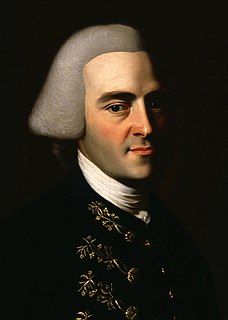 W
WJohn Hancock was an American merchant, statesman, and prominent Patriot of the American Revolution. He served as president of the Second Continental Congress and was the first and third Governor of the Commonwealth of Massachusetts. He is remembered for his large and stylish signature on the United States Declaration of Independence, so much so that the term John Hancock or Hancock has become a nickname in the United States for one's signature. He used his influence to ensure that Massachusetts ratified the United States Constitution in 1788.
 W
WNicholas Herkimer was an American patriot militia brigadier general during the American Revolutionary War. He died of wounds after the Battle of Oriskany.
 W
WThomas Johnson was an 18th-century American judge and politician who participated in several ventures to support the Revolutionary War. Johnson was the first (non-Colonial) governor of Maryland, a delegate to the Continental Congress, and an associate justice of the Supreme Court. He was the first person appointed to the court after its original organization and staffing with six justices. Johnson's tenure on the Supreme Court lasted only 163 days, which makes him the shortest-serving justice in U.S. history.
 W
WAllen Jones was an American planter, American Revolution brigadier general of the Halifax District Brigade, and statesman from Edgecombe County, North Carolina.
 W
WJames Kenan (1740–1810) was an American military officer and politician who served as a brigadier general of the Wilmington District Brigade during the American Revolutionary War and commander of the North Carolina militia after the war. He was active in North Carolina politics and served ten terms as a state senator.
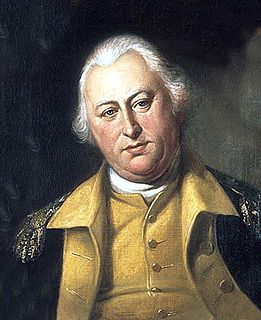 W
WBenjamin Lincoln was an American army officer. He served as a major general in the Continental Army during the American Revolutionary War. Lincoln was involved in three major surrenders during the war: his participation in the Battles of Saratoga contributed to John Burgoyne's surrender of a British army, he oversaw the largest American surrender of the war at the 1780 Siege of Charleston, and, as George Washington's second in command, he formally accepted the British surrender at Yorktown.
 W
WDaniel Lyman (1756–1830) was a New England soldier, Chief Justice of the Rhode Island Supreme Court and member of the secessionist Hartford Convention.
 W
WFrancis Marion, also known as the Swamp Fox, was a military officer who served in the American Revolutionary War (1775–1783). Acting with the Continental Army and South Carolina militia commissions, he was a persistent adversary of the British in their occupation of South Carolina and Charleston in 1780 and 1781, even after the Continental Army was driven out of the state in the Battle of Camden. Marion used irregular methods of warfare and is considered one of the fathers of modern guerrilla warfare and maneuver warfare, and is credited in the lineage of U.S. Army Rangers and the 75th Ranger Regiment.
 W
WJoseph Martin, Jr. (1740–1808) was a brigadier general in the Virginia militia during the American Revolutionary War, in which Martin's frontier diplomacy with the Cherokee people is credited with not only averting Indian attacks on the Scotch-Irish American and English American settlers who helped win the battles of Kings Mountain and Cowpens, but with also helping to keep the Indians' position neutral and from siding with the British troops during those crucial battles. Historians agree that the settlers' success at these two battles signaled the turning of the tide of the Revolutionary War—in favor of the Americans.
 W
WJohn Neilson commanded the New Jersey militia in the northern part of the state during the American Revolution, served in the New Jersey legislature during and after the Revolution, and was one of the earliest trustees of Rutgers University. He is also notable for one of the earliest public readings of the Declaration of Independence, which was recently immortalized in a statue located at Monument Square Park in New Brunswick.
 W
WThomas Nelson Jr. was an American soldier and statesman from Yorktown, Virginia, and is considered one of the U.S. Founding Fathers. In addition to serving in the Virginia General Assembly for many terms, he twice represented Virginia in the Continental Congress. Fellow Virginia legislators elected him to serve as the commonwealth's governor in 1781.
 W
WAndrew Pickens was a militia leader in the American Revolution. A planter, he developed his Hopewell plantation on the east side of the Keowee River across from the Cherokee town of Isunigu (Seneca) in western South Carolina. He was elected as a member of the United States House of Representatives from western South Carolina. Several treaties with the Cherokee were negotiated and signed at his plantation of Hopewell.
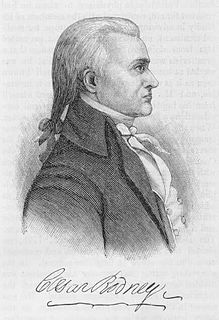 W
WCaesar Rodney was an American Founding Father, lawyer, and politician from St. Jones Neck in Dover Hundred, Kent County, Delaware. He was an officer of the Delaware militia during the French and Indian War and the American Revolution, a Continental Congressman from Delaware, a signer of the Declaration of Independence, and President of Delaware during most of the American Revolution.
 W
WGriffith Rutherford was an officer in the American Revolutionary War, a political leader in North Carolina, and an important figure in the early history of the Southwest Territory and the state of Tennessee.
 W
WJohn Morin Scott was a lawyer, military officer, and statesman before, during and after the American Revolution.
 W
WJohn Stark was a New Hampshire native who served as an officer in the British Army during the French and Indian war and a major general in the Continental Army during the American Revolution. He became widely known as the "Hero of Bennington" for his exemplary service at the Battle of Bennington in 1777.
 W
WThomas Sumter was a soldier in the Colony of Virginia militia; a brigadier general in the South Carolina militia during the American Revolution, a planter, and a politician. After the United States gained independence, he was elected to the United States House of Representatives and to the United States Senate, where he served from 1801 to 1810, when he retired. Sumter was nicknamed the "Fighting Gamecock" for his fierce fighting style against British soldiers after they burned down his house during the Revolution.
 W
WAbraham Ten Broeck was a New York politician, businessman, and militia Brigadier General of Dutch descent. He was twice Mayor of Albany, New York and built one of the largest mansions in the area, the Ten Broeck Mansion, that still stands more than 200 years later.
 W
WArnoldus Vanderhorst was a general of the South Carolina militia during the Revolutionary War and the 38th Governor of South Carolina from 1794 to 1796.
 W
WJames Mitchell Varnum was an American legislator, lawyer, general in the Continental Army during the American Revolutionary War, and a pioneer to the Ohio Country. "The career of Gen. Varnum was active, but brief. He graduated at twenty; was admitted to the bar at twenty-two; entered the army at twenty-seven; resigned his commission at thirty-one; was member of Congress the same year; resumed practice at thirty-three, and continued four years, was elected to Congress again at thirty-seven; emigrated to the west at thirty-nine, and died at the early age of forty." James Mitchell Varnum was a member of the Society of the Cincinnati of the State of Rhode Island.
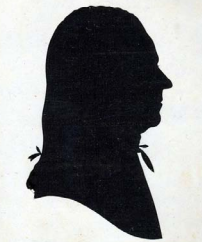 W
WPeleg Wadsworth was an American Patriot officer during the American Revolutionary War and a Congressman from Massachusetts representing the District of Maine. He was also grandfather of noted American poet Henry Wadsworth Longfellow.
 W
WJoseph Warren was an American physician who played a leading role in Patriot organizations in Boston during the early days of the American Revolution, eventually serving as President of the revolutionary Massachusetts Provincial Congress. Warren enlisted Paul Revere and William Dawes on April 18, 1775, to leave Boston and spread the alarm that the British garrison in Boston was setting out to raid the town of Concord and arrest rebel leaders John Hancock and Samuel Adams. Warren participated in the Battles of Lexington and Concord the following day, which are commonly considered to be the opening engagements of the American Revolutionary War.
 W
WWilliam Whipple Jr. was a signatory of the United States Declaration of Independence as a representative of New Hampshire and a member of the Continental Congress from 1776 through 1779. He worked as both a ship's captain and a merchant, and he studied in college to become a judge. He died of heart complications in 1785, aged 55.
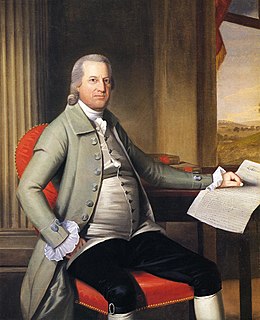 W
WOliver Wolcott Sr. was an American politician. He was a signer of the United States Declaration of Independence and also of the Articles of Confederation as a representative of Connecticut and the nineteenth Governor of Connecticut. He was a major general for the Connecticut Militia in the Revolutionary War serving under George Washington.
 W
WGeneral Nathaniel Woodhull was a leader of the New York Provincial Congress and a brigadier general of the New York Militia during the American Revolution.
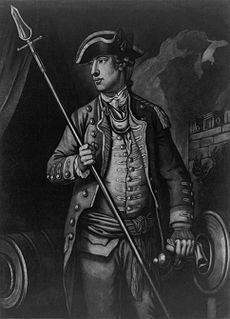 W
WDavid Wooster was an American general who served in the French and Indian War and in the American Revolutionary War. He died of wounds sustained during the Battle of Ridgefield, Connecticut. Cities, schools, and public places were named after him. He has been called "a largely forgotten hero of the Revolution."